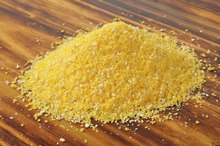What Vitamins Are in Corn?
Whether it’s yellow or white, sweet corn is a good source of niacin, vitamin B-6 and vitamin C. Frozen corn retains about the same vitamins as fresh corn after they're boiled. Canned sweet corn doesn’t fare quite as well. According to information from the USDA Nutrient Database, canned sweet corn has about half the niacin and vitamin B-6 and at least three times less vitamin C.
B-6 to Maintain Mood and Metabolism
Like all of the B vitamins, your body depends on vitamin B-6 to metabolize nutrients into energy. It also helps produce antibodies in the immune system and it's needed to synthesize healthy red blood cells. Vitamin B-6 must be available to make several neurotransmitters, including serotonin. While serotonin is best known for regulating moods, it also influences sleep cycles and appetite. One cup of boiled sweet corn contains 16 percent of your recommended dietary allowance, or RDA, of vitamin B-6.
B-3 to Energize Enzymes
What Are the Benefits of Eating Canned Corn?
Learn More
Niacin, or vitamin B-3, leads a double life: it’s an essential B vitamin you need in your daily diet and, in prescription-strength doses, it effectively lowers cholesterol. You shouldn't exceed the recommended dietary allowance of 14 milligrams for women and 16 milligrams for men unless it's under a physician's supervision because high doses can cause side effects. Niacin supports the activity of more than 50 enzymes responsible for metabolizing energy and producing fats and sex hormones. You’ll get 16 percent of your RDA from eating one cup of boiled sweet corn.
Vitamin A for Healthy Eyes
One cup of yellow corn supplies 13 percent of your RDA of vitamin A. However, white corn has barely a trace amount. Yellow corn contains three carotenoids: alpha-carotene, beta-carotene and beta-cryptoxanthin. All three are provitamin A carotenoids, which means they’re converted into retinol. This form of vitamin A is essential for normal vision and a healthy immune system. Yellow corn also contains two antioxidant carotenoids: lutein and zeaxanthin. They absorb blue light as it enters your eyes, which prevents it from damaging your retina.
Vitamin C for Constructing Connective Tissue
The Best Vitamins to Increase Brain Function
Learn More
Corn may not make the top 10 sources of vitamin C, but a 1-cup serving supplies 8 milligrams. Women should include 75 milligrams of vitamin C in their daily diet, while men need 90 milligrams. It’s critical to get your daily vitamin C to be sure you have enough to fill all its roles in your body. In addition to its job as an antioxidant, vitamin C helps metabolize protein and produce collagen. You can’t do without collagen. As a connective tissue, it supports and strengthens your skin, bones, blood vessels and tendons.
Related Articles
References
Writer Bio
Sandi Busch received a Bachelor of Arts in psychology, then pursued training in nursing and nutrition. She taught families to plan and prepare special diets, worked as a therapeutic support specialist, and now writes about her favorite topics – nutrition, food, families and parenting – for hospitals and trade magazines.









